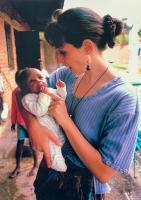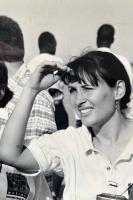Rita Fox-Stucki was born in the Swiss capital Bern on 6 May 1964. Her mother died when she was five, and she grew up with her twin brother and elder sister in an orphanage in the city from 1971 to 1980. She then spent a year in Lausanne, learning French as an au pair, after which she worked as a nursing assistant at the city’s University Children’s Hospital. It had been her dream since a very young age to be a nurse and help others.
In 1982 Rita returned to Bern and trained as a nurse, specializing in maternal and child health. After qualifying in 1985, she spent the next seven years working in the paediatric surgery and neonatal units at Bern’s University Hospital. In 1990 she took time out to travel to Beijing, China, where she spent three months at the Academy of Traditional Chinese Medicine, earning a diploma in acupuncture. She later gained a diploma in reflexology. Rita also had a gift for languages, learning Italian and later Swedish, in addition to French, English and her native Swiss-German.
In 1992 she took a break from nursing to spend the summer season working at Club Med in Ibiza, Spain, looking after babies and toddlers. The following year she had new horizons in her sights, starting work as a flight attendant with the now-defunct Swissair. Rita loved to travel: in addition to China, she also visited Thailand, Indonesia, India, Morocco, Nepal, Tunisia, Kenya, Cameroon and New Zealand. She loved experiencing new people, places and cultures. But at the same time, she was struck by the poverty and poor health conditions in many of these places she visited. Her experiences instilled in her a desire to alleviate the suffering she saw.
After a short spell back at the neonatal unit in Bern, Rita applied to the ICRC to become a health delegate. She began her first assignment, in Kigali, Rwanda, in January 1996. She spent nine months in Rwanda, mainly visiting prisons and other detention centres, checking on the health of inmates.
Her next ICRC posting took her to Tbilisi, Georgia, where in June 1997 she was put in charge of collecting data to measure the prevalence of tuberculosis among the prison population. During her six months there, she earned the respect of all those she worked with, colleagues and detainees alike. In November 1998 she married her ICRC colleague Patrick Fox.
Her next assignment was in Bentiu, Sudan, from January to August 1999, where she worked in a medical centre, treating patients and training local staff. Rita was praised by colleagues for her outstanding personal commitment, organizational skills, constant good humour and, above all, her humanity to others.
In March 2001 she began a new assignment as a health delegate in Goma, Democratic Republic of Congo. On 26 April Rita and five other ICRC colleagues set off from the city of Bunia in two vehicles marked with the red cross emblem. They were heading for the town of Fataki, Ituri province, to assess the needs of health centres and displaced people, and to distribute Red Cross messages. Later that afternoon, all six were found murdered near the town of Djugu. Alongside 36-year-old Rita were four Congolese nationals – Véronique Saro, 33, a health field officer; Unen Ufoirworth, 29, a relief field officer; Aduwe Boboli, 39, and Jean Molokabonge, 56, both drivers – and Julio Delgado, 54, a relief delegate from Colombia.
Speaking at their memorial ceremony, ICRC President Jakob Kellenberger said their deaths were a “crushing blow” for the institution: “They reflect the image of the ICRC as a place where individuals of different nationalities, culture and background come together to follow the ideal of helping their fellows. In many countries we encounter people who express great affection for these men and women who ‘come from afar’ to bring assistance and protection. Some do indeed come from afar, while others belong to the area or country where they work. It is from their combined energies and their mutual trust that we derive our strength. Today we pay tribute to four Congolese, a Swiss and a Colombian who embodied these common values.”
Rita’s journey was rich and varied. From her hometown of Bern, it took her all over the world and eventually led her to her true calling: to help and bring hope to those with no one else to turn to.

